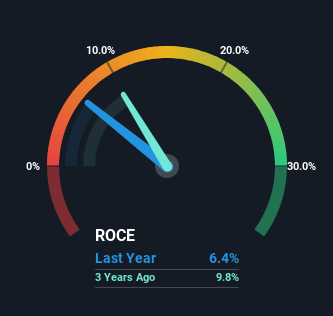- Brazil
- /
- Healthcare Services
- /
- BOVESPA:KRSA3
There Are Reasons To Feel Uneasy About Kora Saúde Participações' (BVMF:KRSA3) Returns On Capital

Finding a business that has the potential to grow substantially is not easy, but it is possible if we look at a few key financial metrics. One common approach is to try and find a company with returns on capital employed (ROCE) that are increasing, in conjunction with a growing amount of capital employed. If you see this, it typically means it's a company with a great business model and plenty of profitable reinvestment opportunities. However, after investigating Kora Saúde Participações (BVMF:KRSA3), we don't think it's current trends fit the mold of a multi-bagger.
Understanding Return On Capital Employed (ROCE)
Just to clarify if you're unsure, ROCE is a metric for evaluating how much pre-tax income (in percentage terms) a company earns on the capital invested in its business. To calculate this metric for Kora Saúde Participações, this is the formula:
Return on Capital Employed = Earnings Before Interest and Tax (EBIT) ÷ (Total Assets - Current Liabilities)
0.064 = R$259m ÷ (R$4.8b - R$719m) (Based on the trailing twelve months to September 2023).
Therefore, Kora Saúde Participações has an ROCE of 6.4%. Ultimately, that's a low return and it under-performs the Healthcare industry average of 10%.
Check out our latest analysis for Kora Saúde Participações

In the above chart we have measured Kora Saúde Participações' prior ROCE against its prior performance, but the future is arguably more important. If you'd like, you can check out the forecasts from the analysts covering Kora Saúde Participações here for free.
The Trend Of ROCE
On the surface, the trend of ROCE at Kora Saúde Participações doesn't inspire confidence. To be more specific, ROCE has fallen from 21% over the last five years. However, given capital employed and revenue have both increased it appears that the business is currently pursuing growth, at the consequence of short term returns. And if the increased capital generates additional returns, the business, and thus shareholders, will benefit in the long run.
On a related note, Kora Saúde Participações has decreased its current liabilities to 15% of total assets. So we could link some of this to the decrease in ROCE. Effectively this means their suppliers or short-term creditors are funding less of the business, which reduces some elements of risk. Since the business is basically funding more of its operations with it's own money, you could argue this has made the business less efficient at generating ROCE.
What We Can Learn From Kora Saúde Participações' ROCE
Even though returns on capital have fallen in the short term, we find it promising that revenue and capital employed have both increased for Kora Saúde Participações. Furthermore the stock has climbed 16% over the last year, it would appear that investors are upbeat about the future. So should these growth trends continue, we'd be optimistic on the stock going forward.
Kora Saúde Participações does have some risks though, and we've spotted 1 warning sign for Kora Saúde Participações that you might be interested in.
While Kora Saúde Participações may not currently earn the highest returns, we've compiled a list of companies that currently earn more than 25% return on equity. Check out this free list here.
Valuation is complex, but we're here to simplify it.
Discover if Kora Saúde Participações might be undervalued or overvalued with our detailed analysis, featuring fair value estimates, potential risks, dividends, insider trades, and its financial condition.
Access Free AnalysisHave feedback on this article? Concerned about the content? Get in touch with us directly. Alternatively, email editorial-team (at) simplywallst.com.
This article by Simply Wall St is general in nature. We provide commentary based on historical data and analyst forecasts only using an unbiased methodology and our articles are not intended to be financial advice. It does not constitute a recommendation to buy or sell any stock, and does not take account of your objectives, or your financial situation. We aim to bring you long-term focused analysis driven by fundamental data. Note that our analysis may not factor in the latest price-sensitive company announcements or qualitative material. Simply Wall St has no position in any stocks mentioned.
About BOVESPA:KRSA3
Mediocre balance sheet and slightly overvalued.
Market Insights
Community Narratives



